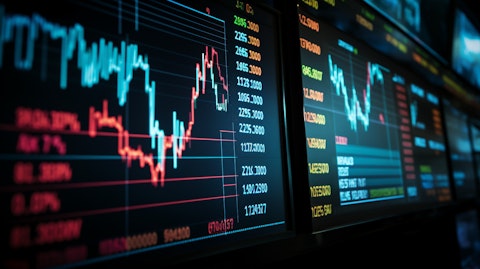As 2025 began, King Lip, chief strategist and partner at BakerAvenue Wealth Management expressed his bullish outlook for tech stocks in 2025 during a CNBC interview. He underscored a strong belief in the continued outperformance of tech stocks in 2025, driven by robust earnings growth and ongoing investments in AI infrastructure. Here’s a short excerpt from our article on the 12 Best Technology Stocks to Invest In for the Long Term that covered this:
“…Lip was against the prevailing sentiment among investors that big tech has peaked and that funds should rotate into smaller stocks or other themes. He argued that the recent weakness in the tech sector is largely due to technical rebalancing rather than a fundamental downturn. He emphasized that cash is likely to flow back into leading tech stocks, as they are projected to deliver the highest earnings growth in 2025, with an anticipated earnings increase of over 20%.”
While acknowledging the high valuations of many tech stocks, he argued that they remain within acceptable historical norms. On January 9, Mark Avallone, president at Potomac Wealth Advisors, joined ‘The Exchange’ on CNBC to discuss why technology is the best sector to invest in right now. He asserts that above-target inflation will prevent the Fed from implementing further easing measures, countering the notion that higher rates are detrimental. He noted that market rates have surged to all-time highs, with a significant increase of 1,800 points since October 2023. Avallone emphasizes that tech stocks, particularly cash-flowing mega-cap and large-cap companies, have shown resilience against rising rates, attributing this to improved operational efficiencies and ongoing technology spending even in a slowing economy.
Avallone highlighted recent deal chatter in the tech sector, including Shutter Stock’s potential acquisition in the uniform space, reflecting growing interest in technology-driven solutions. He is optimistic about the incoming administration’s impact on economic efficiencies and stock performance, particularly for large-cap tech firms and mid-cap companies focused on innovation. He views Hilton favorably for its technological advancements in office management and cost efficiency. In the defense sector, he expressed confidence in Boeing’s growth potential, emphasizing that significant cuts to defense spending are unlikely and that advancements in tech will enhance military capabilities.
Considering the current optimistic sentiment towards tech stocks, we’re here with a list of the 12 best NASDAQ stocks to buy in 2025.

Methodology
We first sifted through the Finviz stock screener to compile a list of the top 20 NASDAQ for 2025. We then selected the 12 stocks that were the most popular among elite hedge funds and that analysts were bullish on. The stocks are ranked in ascending order of the number of hedge funds that have stakes in them, as of Q3 2024. The hedge fund data was sourced from Insider Monkey’s database which tracks the moves of over 900 elite money managers.
Why are we interested in the stocks that hedge funds pile into? The reason is simple: our research has shown that we can outperform the market by imitating the top stock picks of the best hedge funds. Our quarterly newsletter’s strategy selects 14 small-cap and large-cap stocks every quarter and has returned 275% since May 2014, beating its benchmark by 150 percentage points (see more details here).
12 Best NASDAQ Stocks To Buy in 2025
12. ASML Holding (NASDAQ:ASML)
Number of Hedge Fund Holders: 64
ASML Holding (NASDAQ:ASML) is a semiconductor equipment manufacturer that uses nanotechnology through its lithography systems. These systems employ light to imprint intricate patterns onto silicon wafers, which is a crucial stage in chip production.
The company maintains a near-monopoly status in EUV technology, which helps create tiny features on silicon chips. These features are required for advanced applications in AI, 5G, and high-performance computing. EUV machines are costly, often exceeding $300 million per unit, and contribute significantly to the company’s revenue and profitability. In Q3 2024, ASML Holding (NASDAQ:ASML) made €5.9 billion in total revenue, of which €2.1 billion came from EUV sales.
It struggles with US export controls stemming from the US-China rivalry. While ASML Holding (NASDAQ:ASML) has historically sold its DUV lithography machines to China, the sale of its EUV machines remains restricted. In 2023, China accounted for 29% of its total sales, but this is projected to drop to ~20% by 2025 due to restrictions. Globally, the company anticipates shipping fewer than 50 EUV tools in 2025, which is a decrease from the previous estimates made in 2022.
The company remains relevant in 2025 due to the US government investments, particularly under the CHIPS and Science Act. This act allocates ~$52 billion for semiconductor manufacturing and research in the US. In December 2024, BNP Paribas Exane initiated coverage of ASML Holding (NASDAQ:ASML) with an Outperform rating and an €817 price target. They cited its market dominance and the expected 6% increase in revenue by 2030 for the optimistic outlook.
Impax Global Environmental Markets Fund believes concerns about the company’s stock price due to potential US export restrictions to China are overstated given its market dominance in EUV lithography. Here’s what it had to say regarding ASML Holding (NASDAQ:ASML) in its Q3 2024 investor letter:
“ASML Holding N.V. (NASDAQ:ASML) (Efficient IT, Netherlands) similarly to other semiconductor production-equipment makers, the share price has been under pressure on speculation the US may impose additional restrictions on China’s access to semiconductors and equipment. In addition, Intel’s results raised investors’ concerns that ASML would be disproportionately affected by a cutback on capex at Intel, which is a significant customer. The investment team believes these concerns are largely overblown given ASML’s dominant position in extreme ultraviolet (EUV ) lithography for advanced chips, which is where current investment is focused.”
11. PayPal Holdings Inc. (NASDAQ:PYPL)
Number of Hedge Fund Holders: 90
PayPal Holdings Inc. (NASDAQ:PYPL) is a payment services provider that makes it easy to send and receive money across borders. Its platform can be used to shop online, transfer funds to friends and family, and pay bills across approximately 200 markets.
One of the company’s subsidiaries, Braintree, is a global payment processing solution that provides end-to-end checkout experiences for businesses. It offers single-touch payments, mobile SDKs, and global currency acceptance for transactions. Recently, Braintree hiked its prices which may impact near-term revenue for the company. But analysts see this as a strategy to improve long-term value. Morgan Stanley analyst, James Faucette, raised his price target on PYPL from $76 to $90 recently. This was driven by improved investor sentiment, younger consumer preferences, investment calls, increased M&A, and less regulatory scrutiny overall.
Instead of chasing market share with low prices, the company is prioritizing profitability. This includes renegotiating contracts with clients, and potentially handling fewer transactions. But now it charges more for enhanced services like advanced fraud protection and customized solutions. This aligns with the CEO’s vision of focusing on customer value. Resultantly, PayPal Holdings Inc.’s (NASDAQ:PYPL) active accounts climbed 1% to 432 million in Q3 2024, marking the first year-over-year increase since Q2 2023. Wall Street remains bullish on the company, despite recent revenue weakness.
As Braintree returned to providing positive transaction margin in the second quarter, here’s what Artisan Value Fund said about PayPal Holdings Inc. (NASDAQ:PYPL) in its Q3 2024 investor letter:
“Our top contributor was PayPal Holdings, Inc. (NASDAQ:PYPL), a financial technology company that enables digital and mobile payments between consumers and merchants. PayPal was a recent new purchase added to the portfolio in Q2. Better growth in payment volumes and transaction margins during PayPal’s latest quarter offered evidence that the new management team’s efforts are gaining traction. Notably, payment service provider Braintree returned to providing positive transaction margin, branded checkout contributed strongly to payment volume growth, and monetization at Venmo showed progress. Post-COVID, PayPal’s shares had been pressured by intensifying competition, the threat of which was seemingly exacerbated by prior management missteps. Shares traded for under 14X next year’s expected earnings at the time of our initial purchase. This was an attractive entry point to purchase a stake in a business with above-average—and improving—unit economics, a strong balance sheet and consistent free cash flow. Competent new management is already leaning on the company’s strong financial position to maximize the value of these assets.”





